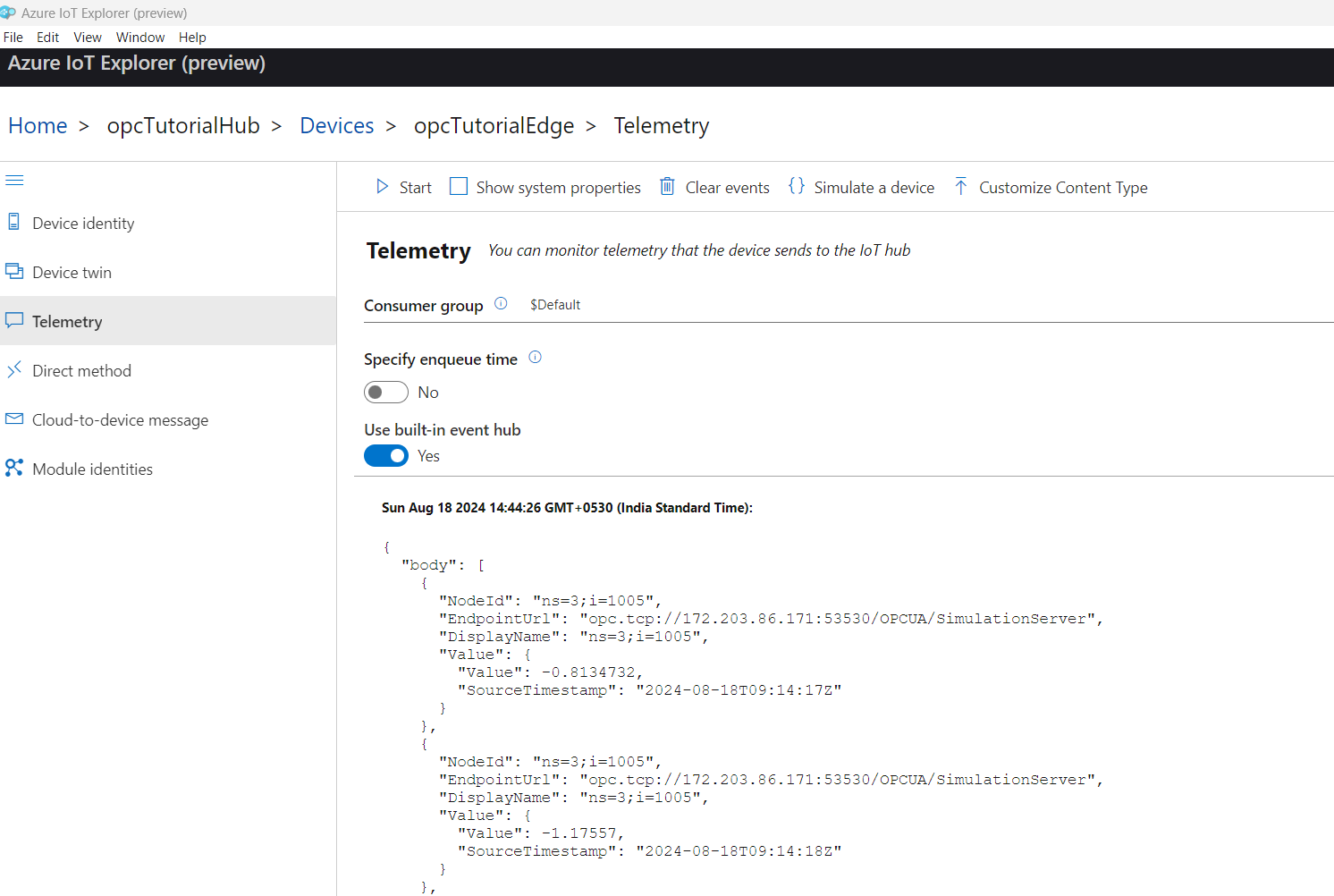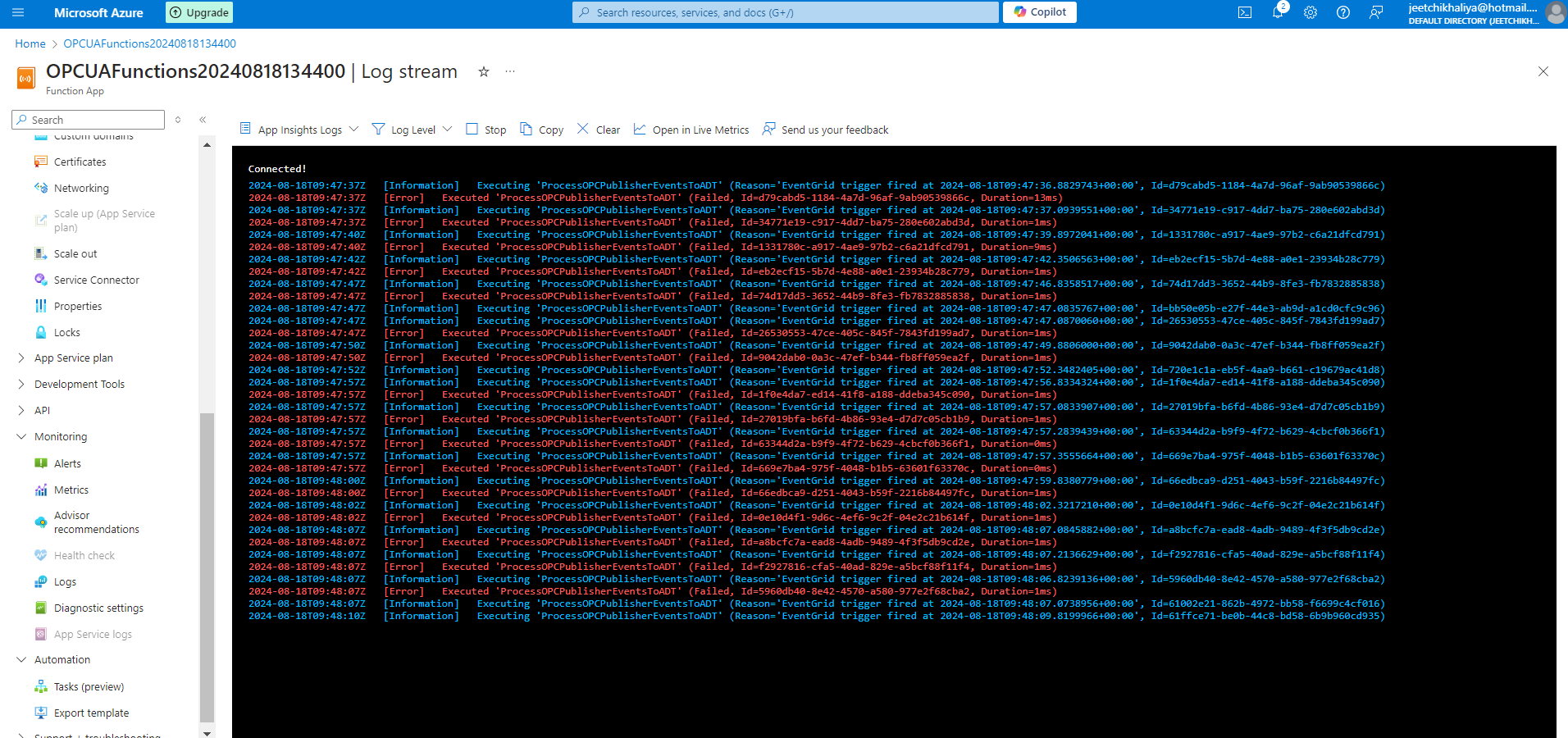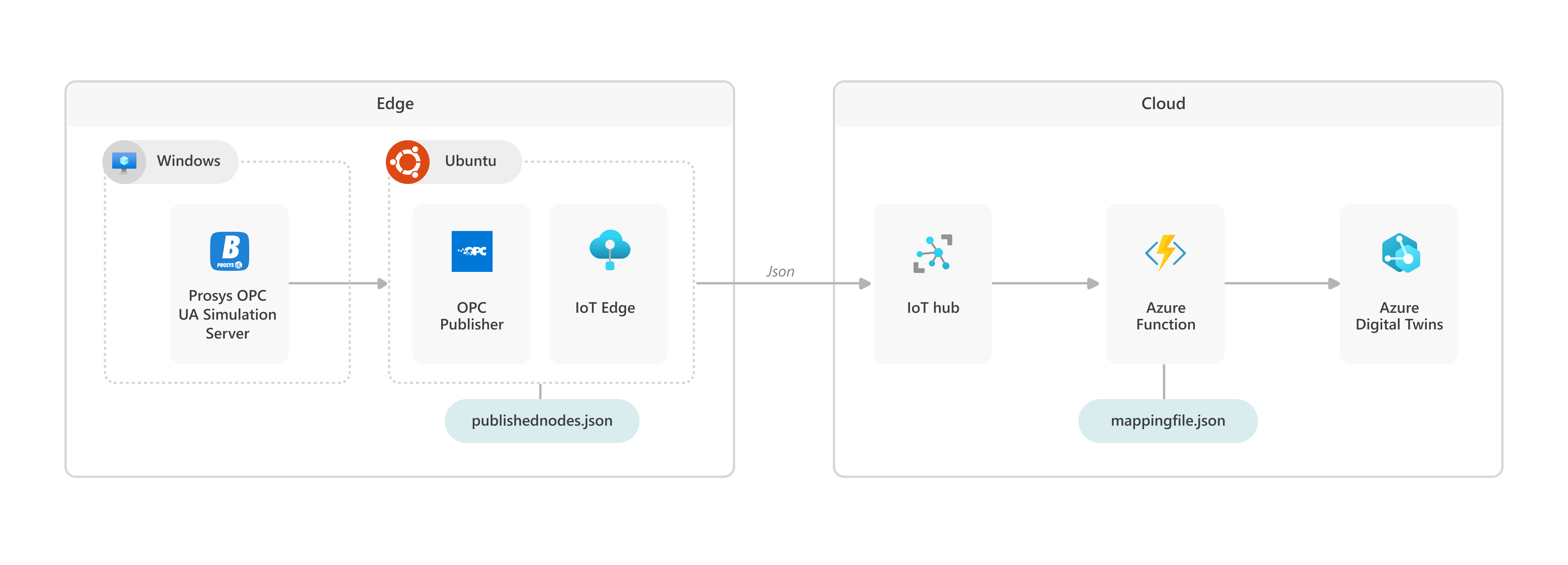I have been trying to figure out why my telemetry data is not being reflected in my digital twins model when i run query. My OPCUA server data is able to successfully send data to the IoT Hub (I am using Prosys OPCUA Server here)
Follow log stream from my azure function,

the following is my azure function code:
// Default URL for triggering event grid function in the local environment.
// http://localhost:7071/runtime/webhooks/EventGrid?functionName={functionname}
using Azure;
using Azure.Core.Pipeline;
using Azure.DigitalTwins.Core;
using Azure.Identity;
using Microsoft.Azure.EventGrid.Models;
using Microsoft.Azure.WebJobs;
using Microsoft.Azure.WebJobs.Extensions.EventGrid;
using Microsoft.Extensions.Logging;
using System;
using System.Net;
using System.Net.Http;
using System.Linq;
using System.Collections.Generic;
using System.Globalization;
using Newtonsoft.Json;
using Newtonsoft.Json.Linq;
using OPCUAFunctions.Entities;
namespace OPCUAFunctions
{
public class ProcessOPCPublisherEventsToADT
{
private static HttpClient _httpClient = new HttpClient();
private static string _adtServiceUrl = Environment.GetEnvironmentVariable("ADT_SERVICE_URL");
private static string _logLevelString = Environment.GetEnvironmentVariable("LOG_LEVEL");
private static Int32 _logLevel = 100;
private static string _mappingUrl = Environment.GetEnvironmentVariable("JSON_MAPPINGFILE_URL");
private static List<NodeTwinMap> _nodeTwinMapList = null;
[FunctionName("ProcessOPCPublisherEventsToADT")]
public void Run([EventGridTrigger] EventGridEvent message, ILogger log)
{
//if (_logMe) log.LogInformation(message.Data.ToString());
_logLevel = isNumeric(_logLevelString) ? Convert.ToInt32(_logLevelString) : 100;
if (message == null || message.Data == null)
{
log.LogError("Message data is empty, exiting run");
return;
}
//if (_logMe) log.LogInformation(message.Data.ToString());
if (_adtServiceUrl == null)
{
log.LogError("Application setting \"ADT_SERVICE_URL\" not set, exiting run");
return;
}
JObject msg = (JObject)JsonConvert.DeserializeObject(message.Data.ToString());
string body = msg["body"].ToString();
// handle base64decode
// if in local debug mode, use a hardcoded decoded string
body = this.base64DecodeString(body);
if (_logLevel >= 300) log.LogInformation($"body:\r\n{body}");
// take body of message and build a strongly typed list of nodes
List<TwinDto> dto = new List<TwinDto>();
List<string> twins = new List<string>();
List<Node> nodes = JsonConvert.DeserializeObject<List<Node>>(body);
dto = new List<TwinDto>();
// get node to twin mapping
IList<NodeTwinMap> mapping = this.GetNodeToTwinMapping(_mappingUrl, log);
// if mapping object is empty, something went wrong
if (mapping == null)
{
log.LogError($"Mapping file did not load from url or cache. Please check the mapping file url.");
return;
}
// build a simplified format of our list
// this will make it easier to sort, order, clean
foreach (Node node in nodes)
{
// get node id
string nodeId = this.getValueFromSplit('=', node.NodeId, 1);
// get mapping information by the node
NodeTwinMap map = mapping.Where(x => x.NodeId == nodeId).Single<NodeTwinMap>();
dto.Add(
new TwinDto()
{
NodeId = nodeId,
TwinId = map.TwinId,
ModelId = map.ModelId,
PropertyName = map.Property,
PropertyValue = node.Value.Value,
TimeStamp = Convert.ToDateTime(node.Value.SourceTimeStamp)
}
);
}
if (_logLevel >= 300) log.LogInformation($"dto:\r\n{dto.ToString()}");
// check to make sure the dto has values
if (dto == null || dto.Count == 0)
{
log.LogError($"Empty list of twins, exiting run");
return;
}
// get a distinct list of twins
twins = dto.Select(x => x.TwinId).Distinct().ToList();
DigitalTwinsClient client;
DefaultAzureCredential credentials;
// Authenticate with Digital Twins
credentials = new DefaultAzureCredential();
client = new DigitalTwinsClient(new Uri(_adtServiceUrl), credentials, new DigitalTwinsClientOptions { Transport = new HttpClientTransport(_httpClient) });
JsonPatchDocument updateTwinData;
// loop through each twin in the list
foreach (string twin in twins)
{
// create new patch document
updateTwinData = new JsonPatchDocument();
// get properties for the twin
// this lets us get all of our properties per twin
List<TwinDto> items = dto.Where(x => x.TwinId == twin).ToList<TwinDto>();
string modelId = items.Select(x => x.ModelId).FirstOrDefault<string>();
// loop through each property and build patch document
foreach (TwinDto item in items)
{
if (isNumeric(item.PropertyValue))
{
updateTwinData.AppendAdd($"/{item.PropertyName}", double.Parse(item.PropertyValue, CultureInfo.InvariantCulture.NumberFormat));
}
else
{
updateTwinData.AppendAdd($"/{item.PropertyName}", item.PropertyValue);
}
}
if (_logLevel >= 200) log.LogInformation($"patch document for {twin}...\r\n{updateTwinData}");
try
{
// check to see if twin already exists or not, if not, we should create it before doing a patch
BasicDigitalTwin dtid = client.GetDigitalTwin<BasicDigitalTwin>(twin);
}
catch (Exception ex)
{
log.LogInformation($"'{twin}' does not exist ({ex.Message}). Creating new twin of model '{modelId}'...");
client.CreateOrReplaceDigitalTwin(twin, new BasicDigitalTwin()
{
Id = twin,
Metadata = { ModelId = modelId }
});
}
try
{
// update twin with full patch document
var result = client.UpdateDigitalTwinAsync(twin, updateTwinData).Result;
log.LogInformation($"Successfully updated twin: {twin}");
}
catch (Exception ex)
{
log.LogError($"Error updating twin: {ex.Message}");
}
updateTwinData = null;
}
client = null;
credentials = null;
}
/// <summary>
/// check to see if value is numeric (float)
/// </summary>
/// <param name="value">string value</param>
/// <returns>boolean</returns>
private bool isNumeric(string value)
{
double output;
return double.TryParse(value, out output);
}
/// <summary>
/// decode a string if it is base64 encoded. If it is plain text, return that plain text
/// </summary>
/// <param name="text">encoded string</param>
/// <returns>string</returns>
private string base64DecodeString(string text)
{
if (this.isBase64Encoded(text))
{
byte[] data = System.Convert.FromBase64String(text);
string decodedText = System.Text.ASCIIEncoding.ASCII.GetString(data);
return decodedText;
}
else
{
return text;
}
}
/// <summary>
/// check to see if the string is base64encoded
/// </summary>
/// <param name="base64String">encoded string</param>
/// <returns>bool</returns>
private bool isBase64Encoded(string base64String)
{
if (string.IsNullOrEmpty(base64String) || base64String.Length % 4 != 0 || base64String.Contains(" ") || base64String.Contains("\t") || base64String.Contains("\r") || base64String.Contains("\n"))
return false;
try
{
Convert.FromBase64String(base64String);
return true;
}
catch (Exception)
{
// Handle the exception
}
return false;
}
private string getValueFromSplit(string item, int pos = 0)
{
return this.getValueFromSplit('/', item, pos);
}
private string getValueFromSplit(char seperator, string item, int pos = 0)
{
string[] subs = item.Split(seperator);
return subs[pos];
}
/// <summary>
/// get mapping file list from json configuration file or cache
/// </summary>
/// <param name="url">url for mapping file</param>
/// <param name="log">logger</param>
/// <returns>List<NodeTwinMap> Object</returns>
private IList<NodeTwinMap> GetNodeToTwinMapping(string url, ILogger log)
{
if (_nodeTwinMapList == null)
{
log.LogInformation($"mapping file cache expired, loading from actual json file.");
string json = new WebClient().DownloadString(url);
if (_logLevel >= 300) log.LogInformation($"url: '{url}'...\r\n{json}\r\n");
_nodeTwinMapList = JsonConvert.DeserializeObject<List<NodeTwinMap>>(json);
}
return _nodeTwinMapList;
}
}
}
<Project Sdk="Microsoft.NET.Sdk">
<PropertyGroup>
<TargetFramework>netcoreapp3.1</TargetFramework>
<AzureFunctionsVersion>v3</AzureFunctionsVersion>
</PropertyGroup>
<ItemGroup>
<PackageReference Include="Azure.DigitalTwins.Core" Version="1.2.2" />
<PackageReference Include="Azure.Identity" Version="1.3.0" />
<PackageReference Include="Microsoft.Azure.WebJobs.Extensions.EventGrid" Version="2.1.0" />
<PackageReference Include="Microsoft.Azure.WebJobs.Extensions.EventHubs" Version="4.2.0" />
<PackageReference Include="Microsoft.NET.Sdk.Functions" Version="3.0.11" />
</ItemGroup>
<ItemGroup>
<None Update="host.json">
<CopyToOutputDirectory>PreserveNewest</CopyToOutputDirectory>
</None>
<None Update="local.settings.json">
<CopyToOutputDirectory>PreserveNewest</CopyToOutputDirectory>
<CopyToPublishDirectory>Never</CopyToPublishDirectory>
</None>
</ItemGroup>
</Project>
My architecture is as shown below:
I got stuck in between Azure function and Azure digital twin connectivity.

